|

American robin, Turdus migratorius.
February 1, 2018 Come, Come, First Robin
February may be the shortest month in calendar time, but for me it feels like the longest. Will the winter ever end? What will overcome cabin fever (being indoors too long) and the itch to get outdoors and turn the soil? In the past, "cabin fever" had a physical and psychological basis in fact; it developed from lack of full spectrum sunlight and fully nutritious foods (including enough Vitamin C), and from lack of ordinary social intercourse due to weather conditions and bad roads; finally, it was an inability by many to get the fresh air needed to overcome a depressive indoor atmosphere in the dark period of the year.
Yes, February's lengthening days are most welcome, as is the sound of the cooing mourning doves -- those wonderful harbingers of spring. We feel that February must be the faint awakening of the new growing season. We strain our eyes to see the faint hue of yellow-green as it appears on the willow trees, and we search for the budding crocuses, the greening wild garlic, the first snowdrop, and the green and yellow mist of winter-growing chickweed. We discover the delights of blooming dandelions under the leaf litter. We extend hospitality to the returning robins who have to suffer through unexpected cold spells -- or do some of them ever leave? And while we await spring in different ways depending on where we reside, here in Kentucky we sow our peas and set out our onion bulbs with hopes that spring will soon come to us. When the weather is a little more open we will start to spade the ground. We will turn the compost pile; we will even consider sowing some radishes and lettuce and cover the patches with cloth as a temporary cold frame. Quite often we get ahead of the weather, but when the crops survive we know we have done the right thing.
FIRST ROBIN
No migrant so earns our gratitude,
When you bid the south adieu.
Perky, alert, wired and clued,
A soon-laden robin with ova blue,
To start a new brood
When that nest is through.
You honor us, your choice of place;
You could have graced another homestead;
The welcome mat is our greenspace.
You feast upon our space instead --
A sign that no chemical trace
Will harm what you have bred.
AF 1998
Prayer: Lord, give us the patience to endure the seasons we don't like, so that we are better prepared for the ones that are pure gift from You.

A candle in the dark.
(*photo credit)
February 2, 2018 Recognize Candle Power
...because my eyes have seen the salvation which you have prepared for all nations to see, a light to enlighten the pagans and the glory of your people Israel. (Luke 2:30-32)
The feast of the Purification of the Virgin Mary is also called Candlemas Day, the day when the candles used in liturgical services throughout the year have traditionally been blessed. It is a fitting time because this is also the middle point of winter, the week when winter is half over by the reckoning of the span from the winter solstice to the Vernal (spring) Equinox.
The ancient wax-and-wick means of lighting is a truly symbolic instrument. It can be a guide; it illumines the way within the house just as a lighthouse directs ships on the seacoast; the candle gives a gentle light, much as Mary gave a gentle glow in her life; the candle is associated with festive events, for it gives dignity to cold, dark interiors. By the way the candle burns, it produces an atmosphere that is truly uplifting; it is really quite liturgical; it beckons us to be attracted like moths; it bonds through its rays. Its flicker adds harmony to the interior environment with shadow play -- a one-candle-power light show.
Advent candles give us confidence that darkness can be conquered; Christmas candles and light announce the coming of Christ to an awaiting world; church candles at the feast of the Presentation foreshadows the strength of sunlight that is coming; candles signify that we are light to others; the Easter New Fire tells us that Christ ushers in a new Creation; and the Paschal Candle announces The Risen Christ. Lighted Easter tapers carried by the congregation show that we strive to imitate the Risen Lord. All candles point to Christ as light of the world.
In Luke's Gospel, Simeon foretells what Mary's motherhood would entail in Christ's future ministry. Mary would enter into the suffering of her son at Calvary. Anna announces that her own life has been fulfilled in seeing the infant savior of the world. There is a sense of mystery woven into this entire event. We realize our part in the picture for we look back to our past (immersed in winter) and look ahead to springtime. We await the Lord; we are called to suffer with the Lord.
The Second of February has both religious and secular significance, because of its placement at the beginning of this mercifully short month. All creatures -- human and non-human (including groundhogs) -- crave the coming of spring; all creatures are focused on what is to come, that is, an end to our half-spent winter. We need to go to the window and look out at the seemingly lifeless landscape. We trust that new life is coming.
Prayer: Like Mary, Lord, help us bear the Light of the World to outer space -- our wounded Earth. Help us hold up the light and proclaim the Good News that the future will certainly be better.
We Need Divine Assistance
Climate change is taking its toll through rapidly melting ice caps, rising ocean levels with flooding, coral reef decline, and more frequent extreme weather events. The period it will take to transfer to a renewable energy economy shortens. Expectations that voluntary compliance by nations will result in greenhouse emission declines are in part wishful thinking. Failure to meet goals to reduce global warming advances includes the withdrawal of the U.S. Ours is a nation that should take an affirmative role because we made a major contribution to the current greenhouse condition through massive resource expenditure since the beginning of the industrial revolution. Realistically, reaching attainable goals to stave off catastrophe seem less likely with each passing month, when 1.5 or 2 degree Celsius global temperature rise will be exceeded. Is it even possible to avert global catastrophe?
The looming failure may be due to the unrealistic inequality that permits a denial mentality on the part of the economically powerful. These want to continue the status quo of a coal, oil and gas economy as long as possible. Profits come before the health of the planet and these can make it so. This scenario differs from the Big Tobacco struggle to retain dominance; the ill effects in that case were millions of people suffering and dying from lung cancer; here the victim is the planet and entire populations submerged by rising oceans and migration to overcrowded uplands.
Urgency-motivated actions cannot be hastened when the inequality persists and a nation deliberately sets a policy of holding back meaningful corrective measures. A secular misconception is that somehow we can succeed and it won't be as bad as the forecasted catastrophe. Part of this material-driven dream world is the media that allows for plentiful allurements that take one's mind off of pending serious matters. Consumer addiction includes forgetfulness about our neighbor, whether those in our backyard or future generations not yet classified as citizens. While Internet makes neighborhood on the other side of the globe a reality, secular thought creates gated villages that forget about those outside of barriers.
This sense of neighborhood is dulled today because the System of affluent and non-affluent classes tolerate gated communities of privilege where neighborhood cannot develop and neighbors intermix and work together. The act of sharing God-given resources can only be achieved if we treat all as part of a healthy neighborhood and understand that essential needs generate insecurity that can have global dimensions. We seem pleased when the wealthy donate a bit of their treasure in charity; we hesitate in demanding that the needy have a right to the wealth of the world -- and those needy are global in scope. The source of this right is in the dignity of the birth of each person, and here the possession and control by a few when the many are in need takes on a character that goes beyond secularism; this right comes through the Divine gift of life.
A totally secular society may have the potential to effect meaningful change, but it does not have the will power to energize it. The weakening of moral resolve by lack of self-denial, whether on the individual level or on that of the state that permits some to own enormous portions of untaxed wealth weakens and even fractures the body politic. We are unable to move forward, not because of lack of some political forcefulness on the part of political groups; we are human beings unable to muster the moral stamina to work together at a level where sharing is part of human nature. A failure to share the resources of the world with all is in fact a moral failure that can only be addressed by public recognition of the God in whom we are to trust. Through this trust we will be able to consider a more just economic System.
Failure to recognize the place of the Divine in our affairs makes this a nation of advancing "nones," in which national collaboration is cast on the shoals of faithlessness -- and these become the predominant voice in the wilderness. Without a Divine focus the place becomes paralyzed, and little can be gained by hoping that the secular world has answers, for it was this enhanced secularity that ushered in the consumer culture with its demands; it was the tolerated individual comfort and convenience that can blind citizens to legitimate demands of a needy world. "Make America Great Again" is part of that utter secularity with billionaires in charge of our national destiny and a tolerant public allowing wealth to dictate national and indirectly global policy. If this is not challenged radically, the planet will suffer, for unfortunately America is big enough to be a spoiler.
Secular forces want to do away with the American motto "In God We Trust;” they prefer "In the Dollar We Trust." For them the private sector (dominated by wealth) takes precedence over public efforts at mutual sharing administered through citizen-monitored government. Believers in the future know that our cherished liberty depends, not on the whelms of self-indulging individuals, but on the mutual give and take of a society working together for the Common Good. For believers, we share a mutual reverence for our Creator and we see the need to resonate with Divinity in a shared love for all. If we do not, then we are cast in a sea of self-gratification -- and the world be damned by an immoral System.
This mutual sense of working together for the Common Good goes beyond recognition of the seat of resonance needed for solidarity and as described in our book Resonance: Promoting Harmony When Confronting Climate Change. Here the general believing citizen who sees a mutual presence and desired future with others is motivated to gain control of the resources needed to establish a renewable energy economy based on mutual sharing of resources. This requires the use of all measures at our disposal, and that includes the power of prayer and mutual worship as a foundation to solving the climate change impending catastrophe.
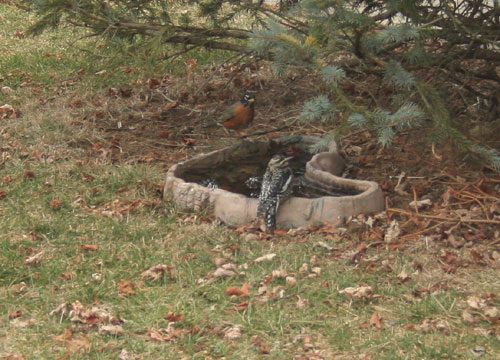
Birdbath provides winter refreshment for a variety of wildlife.
(*photo credit)
February 3, 2018 Show Hospitality to Wildlife
Around Groundhog Day we reconsider our relationship with wildlife. Last year we gave a fond farewell to Professor Wayne Davis, a University of Kentucky biologist and a naturalist, who was a true friend of birds and other wildlife. He built and maintained at least one thousand bluebird boxes and scattered and maintained them along major throughways of Kentucky. All of us who knew him and his works miss Wayne; when friends depart this mortal life, we feel their absence. Wayne was willing to spend time improving the habitat of threatened species. We need to imitate his devotion.
However, some in both rural and urban areas find wildlife to be a problem for gardens and flowerbeds. How do we find the balance in wildlife presence in our midst? How does one protect lawn shrubs and garden from deer, coons, rabbits, squirrels, mice, and groundhogs? There is as much written about wildlife control as about wildlife attraction (bats, bees, birds, butterflies, frogs and other friendly wildlife). We can invite wildlife that can enhance our neighborhood by constructing nesting areas, bird boxes, feeders, watering places and salt blocks. However, for some who hesitate to offer positive enticements, wildlife may be regarded as pests. We tell meat eaters that one ecological principle to consider applying to overpopulated species is to harvest properly what grows locally. Some want, or encourage others, to harvest deer for venison or capture these pesky turkeys and geese for holiday meals. Others prefer Have-A-Heart traps, and then dump captured animals at someone else's garden -- no real solution.
For years when tending a relatively remote but wildlife-loving garden on the banks of the Rockcastle River, I grew produce that the deer, rabbit and coon are not so fond of: okra, the nightshades -- potatoes, tomatoes, peppers and eggplant -- and members of the onion and brassica families (collards, kale, mustard, kohlrabi, etc.), and melons, cucumbers, and squash varieties. At our gardens closer to residences, we find that dogs are the best protection against stray wildlife, which are attracted to delicious beans and peas. Some gardeners even resort to building double fences about six feet apart and four feet high to confuse the deer. Some apply hot sauce solution or garlic to plants.
A broader view of homemaking causes us to attract wildlife friends to the garden for enhanced productivity. Song birds, decimated through loss of habitat, ought to be welcomed as refugees and as partners in promoting organic gardening; this is achieved through providing winter feeding areas, nest locations and bird baths. Some purists among the naturalist community disagree with positive wildlife attractions; however, human activity has threatened these species by destroying their traditional habitats. We may wish to offer positive alternatives, whether for butterflies, hummingbirds and song birds or other wildlife.
Prayer: Lord, welcome us to assist in enhancing all wildlife; help us cultivate a generous spirit of hospitality.
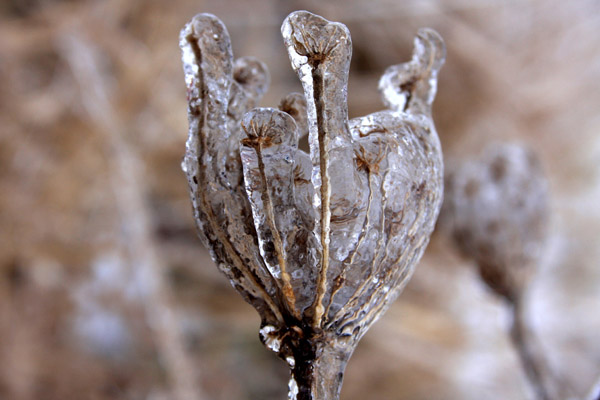
Ice of Queen Anne's lace, Daucus carota.
(*photo credit)
February 4, 2018 Curing and Healing
The whole town came crowding round the door, and he cured many who were suffering from diseases of one kind or another. (Mark 1:33)
Jesus cures publicly and with compassion. We are called to be like Christ in every way. Do we perceive the urgent need to heal as well? To do so publicly? To do so with compassion? Does curing go beyond being a divine miracle, a marvel? We know that as care-givers we can help heal the sick. The world is crowding round our door and includes many who do not know where to turn for help. Are we willing to bring healing to those in need both physically and spiritually?
When we use the term "earthhealing," we extend the powers of curing to this wounded Earth in need of healing. Curing usually refers to sick human beings, whereas the planet's woes are part of the human misdeeds that need to be corrected through our remedial actions. An emphasis is made in earthhealing on reclamation, repair, and renewal. Christ says at the Last Supper that followers would do greater deeds, though we often doubt those words. As healers we are called to help hasten the day of the coming of the Lord and the emerging of the New Heaven and New Earth (II Peter 3:8-14). Our healing is part of the ongoing History of Salvation.
Today, with miracle drugs and new medical technology that eliminate diseases, replace organs and repair body parts, we enter
a research emphasis on cures of various sorts. Many cry out and yet because the facilities or resources are limited and unavailable, they are neglected. Healing is extending justice in curing to all in need, continuing Christ's compassion. The saving power of Calvary moves out to all -- the curing of our wounded Earth and its people -- in space and time. Through the mystery of the Eucharistic event we enter into the curing ministry that Christ initiates. Through his incarnate bonding, Christ becomes one with us so that we might become participants in the divine family.
Jesus comes to heal all who are afflicted physically and spiritually. Diseases of many types afflict many; we are also called to engage in healing ourselves so that we are all the more able to care for others in need. Physical healing includes such care-giving as nursing and caring for the sick, the preventative care that is given through wholesome nutrition, care for eyes and teeth, good environmental practices, and remedial means of caring for those who are harmed or damaged in any way. At the same time spiritual healing comes as well through baptizing, confirming, reconciliating, distributing communion, anointing the sick, praying with and for others, practicing the works of mercy, encouraging the depressed, and developing a contagion of happiness among all who await the coming of the Lord in longing.
Prayer: Lord, teach us to enter into your curing ministry as it relates to a wounded Earth, people who need physical curing, and those who are in need of your mercy.
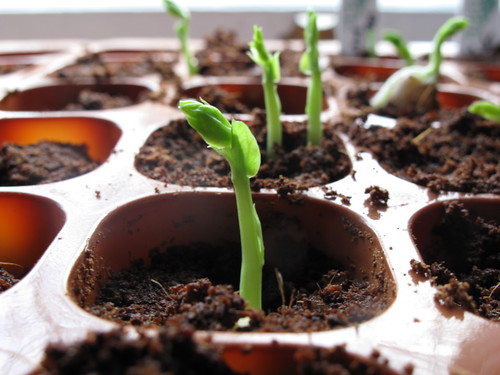
Early pea seedlings.
(*photo credit)
February 5, 2018 Initiate Early Gardening
While seeking the craved improvement of seasons in February we may decide to start outdoors at the first convenience and break winter's spell. My Great Uncle Louis would start his hotbeds on January 2nd -- not wasting any winter time. He was an ultra-early gardener. However, February is a good time to take our January resolutions and begin to put them into effect. Maybe this sounds foreign to those in more northern Wisconsin or New England, but in the warming zone in which Kentucky finds itself, we can and should start early. And this includes a growing portion of America.
While my mother was still an active gardener, she would always sow her peas in February. She said that the March cold spells would not harm these hearty plants and it allowed for a bountiful early harvest -- and she always had a good crop. I have tried to follow her example, for it triggers the grower's creative juices, namely, start gardening as early as possible for good results. Obtain onion sets and plant the brassicas (cabbage, cauliflower, Brussels sprouts, broccoli, kohlrabi, kale, etc.) into the ground as soon as possible, so they will bear before the late spring pests and heat get to them.
For some it means following the early moon signs for adding radishes, lettuce, Swiss chard, endive and spinach. Many times the seeding may have to be done a second time when started very before spring commences. The secret is early gardening even though some crops may be at risk due to late winter cold spells is to assist by covering the new seedling once they come up. While autumns tend to linger, springs move quickly in Kentucky, and many spring crops planted too late turn quickly to seed in early summer -- and are better suited as fall crops.
The covering may prove essential using temporary cold frames and/or mulch such as straw. Gardeners realize that protection is often from cold winds as much as from the temperature itself. If you live in a growing zone that is further north and you never start a garden until say April or May, I will repeat the advice -- even there start a little earlier in milder winters due to climate change. Some crops can stand the late cold weather quite well. Think of not waiting for spring gardening until the tomatoes can be planted outdoors. If you are serious about gardening, then resolve to be early, for this results in a positive attitude about life.
Gardening at the first opportunity carries us well when summer slows us down. Don't wait to the last moment; it is too stressful. Under some extraordinary circumstances one may succeed in being late; if it becomes a habit, it makes others distrust your work ethic and may result in less cooperation. And healing our wounded Earth does require sensitivity to what needs to be done here and now. Replace "better late than never" with better early than late.
Prayer: Lord, inspire us to become the early birds of our world, for our healing ministry requires early risers.

Bluejay, Cyanocitta cristata, finds shelter in shrubs.
(*photo by Sally Ramsdell)
February 6, 2018 Identify Sacred Private Space
Certain sites have special significance religiously, patriotically, culturally or personally. They have meaning for us and their presence reminds us of persons and events worthy of continued reverence. We need our own unique sacred space and sites. Variety can enhance respect whether that be biodiversity, multiplicity of art forms, different musical sounds and songs, or people each with a special life story to tell. Sacred sites are the assortment of locations (parks memorials, sites and shrines) where the heart, mind and whole being are moved to the wonder of Creation; they can trigger our collective memory. Through a sense of common purpose most communities identify their own "Sacred Sites," that is, accessible public places set apart by communities.
We each need to designate proper "sacred greenspace," which stimulates all of the senses ---- the beauty of a unique scene or vista, the scent of evergreens or seawater, the sounds of wind, birds, or rushing water, the texture of rock or tree bark, and the taste of sassafras or berries. Such a confluence of stimuli makes a natural meditation area, a place to be alone with God. Many sites are plainly visible and known to all; others are known to only a few, so trespassers would not discover the place. Our faith in the Incarnate One is sensuous and Catholic Christians especially have a propensity to find such sites of special interest. As Mitch Finley says in The Seven Gifts of the Holy Spirit (p. 19), "We like to touch, taste, and smell God -- or, at least, we like to touch, taste, and smell God's presence." Such sacred sites give us these opportunities.
A sacred site has a powerful effect in forming community as a natural gathering, reflecting, or resting place. Particular site selection criteria include: secluded, but not totally so, for people fear vandalism; accessible for a great number of people; scenic and devoid of major distractions such as noise; natural and with minimal development, conducive to prayer and reflection; and held as unique by landholders, residents, or other interested parties. In some cases, one finds out about these sites through seeming happenstance and discovery. For instance, archaeologists may uncover artifacts indicating that indigenous peoples worshipped in a given location. A certain site -- birthplace, imprisonment, awakening, gathering, battle, or immense suffering -- becomes hallowed by reason of an event that occurred there -- and we honor it as sacred space. Yes, shrineless persons have lost direction.
While those confined by illness, lack of mobility or impeded by imprisonment may discover sacred space within the heart, most of us ask more. Is this place safe? Handicap accessible? Well maintained? Does it have an atmosphere of peace? Is the artistic decor and architecture uplifting? Does silence prevail or is it too noisy, too claustrophobic or too spacious, too dark or too light, too colorless or colorful, too comfortable or too frugal?
Prayer: Lord, help us to discover our sacred space and sites.

An aged tree at Bernheim Arboretum and Research Forest.
(*photo credit)
February 7, 2018 Let's Accept Old Age
Wisdom creeps in when we realize that it is better to live one's age than to try to be someone younger. It does not mean we should stop taking care of ourselves, or should "retire" for that matter. Pacing ourselves is better than stopping all together.
Yes, we are old when --
* Anniversaries outnumber birthdays.
* Tools we used in youth are found today in museums.
* We name favorite movie celebrities, and get a blank stare.
* The price we expect to pay for an item was about right thirty years ago.
* Most of the obituary notices are of persons younger than we.
* There's a new ache each day.
* Christmases come much faster than when we were young.
* There are more funeral gatherings than other celebrations.
* One remembers clearly things forty years ago, and can't even
list one thing that happened last week.
* The old home neighborhood can't be recognized.
* We start to thank God for allowing us to wake up.
* The geriatric catalogues have some good bargains.
* Every scale seems to be weighing too heavy.
* They tell us to be careful shoveling snow.
* The waitress assumes you want the senior plate.
* World War II seems like yesterday; the Vietnam War is a distant past.
* We begin to think it is okay to repeat ourselves for emphasis.
* Youth for us is old age for the really young.
* Many seats look inviting until we remember we have to get out of them sometime later.
Prayer: Lord, help us to grow old gracefully and with a sense of humor in which many can laugh with us at our foibles.
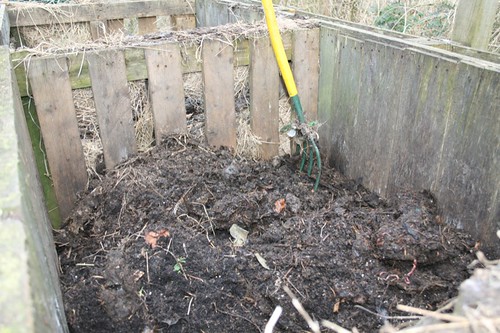
A healthy compost bin.
(*photo credit)
February 8, 2018 Good Reasons for Composting
This year is a perfect time to recommit ourselves to natural recycling of kitchen and yard wastes -- that is, composting. Life is already returning to this seemingly motionless winter world and it is time for us to assist nature in bringing forth new life. Yard wastes (grass, tree leaves and trimmings) as well as non-meat kitchen wastes can be composted through the combined work of earthworms, friendly bacteria, moisture and air, in outdoor or indoor containers. The amount of time needed to convert waste products into humus for the garden will vary depending on weather, condition of the composting medium, and human assistance. The process works faster when the pile is mixed regularly to increase air flow, and when the proper amount of water is present; a balance of carbon and nitrogen must be maintained. Under suitable conditions, animal manures can be composted for gardens.
We can list at least six reasons for composting:
1. Encourage natural processes -- Through composting, materials that could be discarded are reused in growing areas as organic humus matter. These include: yard products (branches, leaves, etc.); garden waste (vines, stems, etc.); orchard and agricultural waste; animal and barnyard wastes; and kitchen wastes (non-grease products); some office and paper wastes.
2. Prevent pollution -- Potential burdensome landfill discards are converted to welcome organic matter. This cuts landfill volume in many places by as much as half.
3. Furnish a mulch source -- Composting is not only efficient natural recycling but the product is valuable soil amendment.
4. Provide an Opportunity for Physical Exercise -- Composting proves to be an ideal, virtually year-round, outdoor workout.
5. Present a Model of Environmental Education -- Composting is an ideal way for educating youth, friends and neighbors in proper resource use.
6. Exercise Responsibility -- Through composting, one reduces the waste in one's backyard and does so without burdening landfills with waste. We take responsibility for wastes generated and do not pass them off onto other (generally poorer) communities.
Devices and procedures for composting include bins that need not be commercial or virgin resources in themselves. For example, outdoor composting bins can be made from discarded wooden pallets or slabs; kitchen composting boxes can be made from wooden packing crates or ammo boxes; large-scale composting use wind-rows made by heavy machinery. One pollution prevention practice is to compost waste materials directly in unoccupied garden or cropland space.
Prayer: Lord, teach us to use resources wisely and to reuse them in natural ways for the benefit of all.
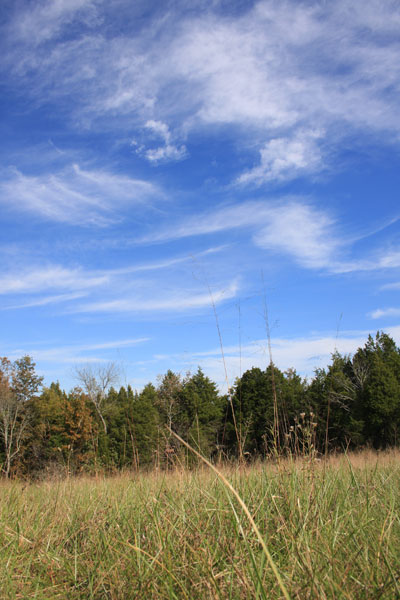
Eastward sky view, unblemished by plane vapor trails.
(*photo credit)
February 9, 2018 Confronting Noise Pollution
In winter, we hear distinct outdoor noises, which are generally dampened by late spring, summer and early autumn foliage. As the weather becomes milder a sleeping world comes alive: barking dogs, squealing children at play, revved up motorcycles, crows cawing, jackhammers, railroad trains, airplanes. These sounds are measured in decibels (see Sounds and Silence in the special issues section of this website). With noise becoming a major environmental problem, we must work on two fronts: to confront the noise source and to champion silent space. Doing one without the other is not sufficient, for one is the problem and the other the solution.
Noise affects people urban and rural, rich and poor, old and young, those indoors and those outdoors. Noise affects us without us acknowledging its effects. In our culture it is assumed that freedom of speech includes the freedom to make noise -- but that is a misinterpretation. We are not free to harangue others or pester them -- that is a misuse of sound. The noises we make could be regarded as our desire to be noisemakers and attract attention as boorish characters -- but that infringes on others' right to their own silent space needed for health and well-being.
Youth are vulnerable to noise pollution, since many attempt to tolerate loud music that can cause irreversible inner ear damage. Teenagers attend rock concerts that register 110 decibels or more, while 115 is the limit beyond which the Occupational Health and Safety Administration (OSHA) forbids any unprotected exposure. Young children play next to noisy highways. Senior citizens may live in congested noisy neighborhoods, and endure the racket of a kitchen garbage disposal that can reach 75 decibels. The best estimates are that overall noise levels have increased by about 20 decibels over the past half century. Leaf blowers can reach 100 decibels for the operator.
The dangers of noise pollution have long been recognized. A 1970 study for the City of New York warned that noise levels in that city were "intense, continuous and persistent enough to threaten basic community life." Some say that noise increases the secretion of adrenaline in humans, perhaps because our ancestors were alerted to dangers from the roar of the lion and the screams of a baby. Studies by the U.S. Office of Consumer Affairs have revealed a causal link between noise pollution and sleeping disturbances, increased blood pressure, irritability, and fatigue. Little wonder ear protection is advised for those with prolonged exposure at higher noise levels such as airline baggage handlers and traffic managers. However, far more significant than living with noise are attempts to confront the noise source: help obtain silence zones for hospitals; see that noisemakers are challenged by police; dampen noisemaking within homes, study and work places; and get others to assist in quieting this world down.
Prayer: Lord, give us the grace to see when we must speak and when the activities we perform are judged disturbing to others.
Awareness of an Imperial Presidency
It is fully within our right and duty as a democracy with a republican form of government to speak out boldly against any manifestation of an imperial presidency. The American Colonists were well aware of imperial governance, with the many faults of British King George III enumerated in our Declaration of Independence. That abhorrence of imperial rule led to the Revolutionary War and its success in establishing our country (though Canada did not join in that struggle for independence). An avoidance of imperial rule was a matter of great importance to the authors of the Federalist Papers and to the framers of the U.S. Constitution; in that document the divided powers of Administration, legislation and courts were clearly enunciated. At the start George Washington insisted that we say "Mr. President" and not some title of nobility or utter deference. The chief administrator was to be one of the citizens, not an overlord.
The concern from the start was to what degree if any the president was to act on his own initiative. While the nation was small and struggling, the temptation to imperial rule arose during the John Adams Administration but was quickly overcome. The nation had little military force and the struggle for federal financial wellbeing was a major beginning issue. Furthermore, the sovereign states could exert immense influence over the weak federal government when tariffs and sale of public lands brought in limited revenue. Certainly Andrew Jackson showed a growing sense of authority, but not necessarily imperial controls. Congress furnished many checks and balances, especially in the climate of slavery versus abolitionist differences throughout the early nineteenth century. Abraham Lincoln had to set a very careful course with a rambunctious Congress during the Civil War.
This delineation of powers was prominent in the ratification of treaties and the U.S. failure to join the League of Nations (to Woodrow Wilson's great disappointment). The duty of Congress to declare war was adhered to up to and including Franklin Roosevelt's famous request after the Pearl Harbor attack. The efforts of FDR to combat isolationism and to assist Britain took on the cast of imperial action. However, another step was taken in the Korean “police action" by President Truman with an authorization of the United Nations, not Congress. The seriousness of the action can be reflected by the thousands who died and were injured during that prolonged conflict. The authorization of Congress to partake in the aftermath of 9-11 in 2001 has been expanded by Presidents Bush and Obama -- and now Trump -- to include a variety of actions ranging from those in Iraq, Libya and the Balkans to those in Somalia, Syria, Yemen and Mali. In essence there is no specific nod from Congress for the Commander-in-Chief to broadly interpret such actions as an immediate threat. And what about the option to trigger a nuclear blast by a sitting president?
Imperialism includes a range of attitudes and activities that some would interpret as "presidential powers," and this can erode the division of authority over the long run -- and behold an emperor! Here are some specific imperial characteristics:
* a sense of exultant privilege or being above the law in manner of personal actions and policies;
* an expectation of deference by others to the august office of the imperialist and that this special person is respected;
* a claim by the imperialist that he or she is not only above the common person but superior to them in a number of ways;
* an acknowledgment on the part of the people that they are subjects and not fellow citizens of the imperial president; and
* a cultural acceptance that this is a better form of leadership during critical times.
Could it be possible that with some personal hurt or misconception or threat to this power an American President would decide to compensate by expressing power in some manner? Is the movement to an imperial president a stepwise process that continues to erode the delineation of powers without a careless citizenry even taking note? Is this possible when the commander-in-chief stands over the greatest military might the world has ever known? Does this blurring of duties extend to insulting another nation by the insult of "Rocket Man," who is driven by near madness to target the U.S.? Since the 2016 election this is a nightmare. Who is to blame for this imperial status, this chance for Earth-shattering decision-making? Is it entirely the President who might even think it advisable to manifest the threatened power and fury mentioned? Could it even be a first strike? Perish the thought, as though our thinking might possibly penetrate the White House through mental telepathy. We can be assured that the matter was one of actual discussion within DC circles. Certainly the thought of solitary action on the part of one who thinks himself utterly important did occur to a portion of the electorate, but not enough to have secured another outcome. There's collective blame.
If the weakness of imperialism is in the decision-making by a single individual -- even a very wise and balanced individual -- still it ought to be avoided in a truly democratic society. At all times the separation of powers must be championed by an alert citizenry and respected as the brilliance of our Founding Fathers. To allow this to be dulled by one group or individual is a desecration of what we hold sacred. The fact that well meaning individuals have been partly responsible is not sufficient reason to fail to reaffirm that our president must be a citizen one.
Why are environmentalists concerned about imperial presidents? Donald Trump has unilaterally removed our country from the Paris Climate Change Agreement, a singular action by a major polluting nation. Such an action is opposed by a community of nations and a major portion of Americans. Withdrawal from this global agreement can retard efforts, which are critical at this moment. National emergency is compounded when an imperial leader believes he has the power to take singular action. Where are we now?

A cache of cracked nuts.
(*photo credit)
February 10, 2018 Curb Fat Twelve Ways
This coming Tuesday is Mardi Gras or Fat Tuesday, the anticipation of the Lenten Season and a good reason to curb fat intake during the coming months. The ancient tradition involved removing animal fats and meat from the kitchen for a totally meatless menu during the season. We all need some fat in our diets, but this is a need, which most Americans do not have trouble supplying. The smell of Big Macs comes to us on the byways and sidewalks, and most of us find it hard to resist (though some do). However, we can curb fat intake in several ways:
1. When having a meal in a fast food place, choose salad or salad bar and soup, and forget the fried meat and French fries -- which they always make an extra effort to push off on us!
2. If you are not a vegetarian, consider only low-fat meats at the grocery and also try those veggie substitutes, which taste more and more like the real thing.
3. Pass up the donuts and pastries in the shopping line even though they seem tempting at first.
4. Buy unsaturated cooking oil for cooking purposes.
5. Omit butter and cream, and cut down on spreads and cream sauces at meals. A good substitute for the sauces is low-fat mushroom soup.
6. Fry less, and boil, broil, bake, sauté, and steam more.
7. If you are a snacker, watch certain enticing foods. How about popcorn, dry-popped and seasoned with chili and garlic powder? How about pretzels or fresh fruit or carrots?
8. Buy low- or no-fat selections: salad dressings, milk and other dairy products, breakfast cereal, baked goods.
9. Egg consumption can be reduced. We don't need a breakfast defined by eggs. How about only two such meals per week?
10. Blot off fat when bacon or other cooked meats are being prepared. Use paper towels to absorb excess fat.
11. The taste of imitation creamer may not equal the real stuff, but most people are willing to modify beverage drinking tastes.
12. Reduce the amount of cooking oil or fat. Consider adding olive oil when fats and oils are needed. Middle Eastern people, who use olive oil for cooking, have fewer heart attacks and appear to be healthier.
Prayer: Help us, Lord, to see this upcoming Lenten season of late winter as an opportunity to modify our eating habits.

Rural Kentucky farm scene in winter.
(*photo credit)
February 11, 2018 Touching Compassion for the Infirm
If you want to you can cure me. (Mark 1:40)
Jesus feels sorry for the simple request of the leper and responds that "Of course I want to!" "Be cured!" Jesus touches him. We find several revealing characteristics of Jesus in these few words: he has ongoing compassion for others, especially those who come to him for curing; he regards the request as part of his ongoing mission and that is an unquestioned part of him; he effects the cure as requested; he goes out of his way and touches the leper, something that is not always regarded as proper in his world where one could be easily contaminated by another.
People make equivalent statements to the world community of care-givers: "If you want to, you can cure me." Are we as willing to touch the sick as Jesus was (not just those with contagious diseases but all people)? We are part of that community of compassion and so we respond in a manner similar to Jesus, "Of course we want to!" However, for us the action of curing is more than a verbal affirmation. To be cured takes some effort and is not always successful. Effort includes a variety of medical technologies and medicines, some of which cost much. In fact, it is not the possibility of curing that is the major barrier today, but lack of affordable and available medical care for all people -- not just in this country but throughout the world. Some say, "If we cannot provide for Americans, why consider the foreign infirm?"
All human beings have a right to proper health care. Yes, compromise may be necessary in an effort to get more care to the greater numbers. It sounds reasonable, and certainly a limited amount of rationed care is necessary if medical resources are finite. Rare and high-priced procedures and medicines could be limited as a last resort to those of greater need such as people with dependents, but remembering that health care is meant for all.
However, even within this compromise mode of curing, certain facts should be remembered: personnel are theoretically plentiful -- resources including human care could include the training of people to help with the care-giving; needs are really here; the cures are theoretically available and some such as forms of vaccination and malaria prevention are quite low-priced. The barrier to world health is the availability of resources and the will to make these available. Certainly, by diverting only a small portion of the world's one-and-a-half-trillion dollar military budget, universal health care could be provided. The fact is that our resources are here but are misspent and highly controlled by those in power. High priced salaries and profits of the military/industrial complex could be redivided in the health-delivery systems of the world: hospitals furnished; generic drugs manufactured; and health systems established to handle the crushing case load. War against disease is forthgoing!
Prayer: Lord, teach us to do the possible and the necessary.

Scenes from Abraham Lincoln's New Salem
(*Photo by Mark Spencer)
February 12, 2018 Celebrate Abe Lincoln's Birthday
As a loyal Kentuckian I admire our sixteenth president. I have visited virtually every place dear to him --his birthplace, early home, Springfield. Illinois house, Salem haunts, mother's cemetery, stepmother's farm, the Speed (his best friend's) and Todd (his wife's) Kentucky homeplaces, the room in DC where he died, and his tomb in Springfield. Visiting these shrines to our beloved president is akin to a pilgrimage in which we resolve to....
* Strive for goals that seem beyond us;
* Proclaim equality among all our people;
* Work with those with whom we disagree politically;
* Foresee a better future for all people;
* Be enthusiastic about the difficult tasks ahead;
* Overcome poverty, resource deficiencies and handicaps;
* Treat fairly those who are underprivileged;
* Become color-blind when it comes to distribution of work and responsibility;
* Overlook those who call us bad names or demean us;
* Be exposed to public scrutiny and the risk of ultimate sacrifice for the good of all;
* Adhere to the rule of law and the love of order;
* Realize that the sun can penetrate the darkest clouds;
* Show love and loyalty to family and friends amid adversity;
* Accept that we must work with those who are mean-spirited;
* Forgive our enemies;
* Speak good words briefly and to the point;
* Show utter compassion for the ones condemned to die;
* Place a deep trust in God who makes all things right; and
* Encourage faith in a future that will be fulfilled after we are gone.
Prayer: Lord, help us to admire the great leaders of our past and to pray that their virtues be passed on to current leaders and to all our citizens.
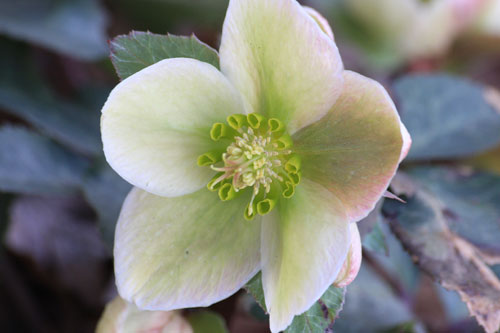
A February-blooming lenten rose, "hardy hellebore."
(*photo credit)
February 13, 2018 Welcome Ashes
Tomorrow is one of the most meaningful liturgical actions; this involves blessing ashes and distributing them to the faithful people. Here is a holy time and place when and where the sacredness of all creation becomes quite evident. Once a year we confront our finitude in a special way. Time for us mortals is limited, for life is but a brief candle, and our journey is short. We are from and to dust, and ashes remind us of our condition.
Ashes (or dust) are a powerful symbol that was used far back in Judeo-Christian tradition. Ashes were the sign of penance and a humble stance before the Almighty. The cleansing properties of ashes may be taken as signifying moral purification. In the early Middle Ages the dying were laid on sackcloth sprinkled with ashes and asked to affirm their condition before their Creator.
We may be tempted to say that ashes are weak symbols and only meant to be quickly discarded; that is not the case. In blessing the ashes, the Church's ministers extend the Creator's loving hand to what seems so commonplace. We see something holy that others will pass over and tend to forget or ignore. For all of us, ashes are a reminder of how fleeting life is. In sacred time we accept Ash Wednesday -- a day of great significance in the onrush of events for it gives value to our brief and fragile mortal span.
It is not enough to have tomorrow set aside for the presence of sacred ashes; the place is also important -- and that place is the living human beings who believe and thus give this sacred practice a special meaning. The presence of the ashes tells us and others that we are people who are committed to doing special penitential deeds during the upcoming Lenten season. Creative participation involves encouraging all to touch our Earth: those living complex lifestyles, those who are in life's ruts, the embarrassed and diffident, and those who think themselves too busy with many things. It may be embarrassing at first for it involves getting our hands dirty. But one can soften the invitation by helping aspirants to anticipate the hurdles to becoming humble. Truly, touching Earth is necessary for grave diggers, mud puddle players and potters. We should all reverently touch the soil and feel its rhythms. This is a golden opportunity to enter into God's creative act. Some prefer other liturgical expressions, but still welcome the place of ashes and dust at this time of year.
Blessed ashes signify the passing of the old and the beginning of new life. Just as ashes can be a garden fertilizer for future productive plants, so our involvement with ashes can help enliven the world around us. If we are blessed with humus or humble ashes, we are moved to bless all around us. Let us resolve to bless other neighbors, humans and non-humans. Ashes are a start -- a fresh beginning for a troubled world.
Prayer: Lord, remind us that we are dust and into dust we will return. Help us appreciate the simple things in our lives.

A cross-section, heartwood.
(*photo credit)
February 14, 2018 Turning Words into Deeds
Besides being Ash Wednesday and the beginning of Lent, today is also Valentine's Day. In the fifth century A.D., Valentine's Day became one more Pagan feast that was "baptized" or affirmed in its good qualities -- as are other non-Christian rituals with good elements worth celebrating like Christmas. Here an early love feast was associated with an early Roman martyr named Valentine. Much of the current tradition of gifts of cards, flowers and candy is from late Middle Age and more recent practices. The more light-hearted and comic Valentine presents are of more recent vintage.
Many of us find it easier to say "I love you" to another through deeds rather than words. The billions of verbal expressions over the centuries seem hollow when spoken; loving deeds have so much more meaning than loving words. We sense this inadequacy when trying to console a person over the passing of a loved one. All words fail us -- and that is why those who send flowers or cook a dish for the survivors are really trying to overcome the verbal handicap through concrete deeds. How do we express what is deep in our hearts -- through our mouth or through the works of our hands with an expression of our heart in them?
Yes, we are drawn to speak because we so often attempt communication through words or at least symbolic gestures. Really the Valentine is a symbol seeking to express extended love of what God has shown to us. In turn, we show our gratitude by sharing that love with others. Perhaps this is the perfect time to ponder Alfred Lord Tennyson's words in In Memoriam, "'Tis better to have loved and lost, than never to have loved at all." Our words fail us at times; we stumble; we are embarrassed by fumbling expressions -- and yet we continue to try even when only partly successful.
God is Love, the Holy One who extends love to us. Our existence is the divine loving deed; the inspiration in our heart is the loving act first spoken by the Other to us personally in our coming to be. So often, as fellow Jesuit Max Oliva writes in his book, Free to Pray, Free to Love, we do not have an adequate awareness of the unconditional love that God has for us. In part, this is due to our lacking of love for ourselves. We find it difficult to see how God could love us so, since we are aware of our own failures. Max Oliva quotes Thomas Merton, "To say I am made in the image of God is to say that love is the reason for my existence, for God is love."
Prayer: Oh God of love, allow us to love as you have loved us, and to express this in deeds to others. Make our concern and compassion a part of our prayer. Teach us to comfort others with gentleness. Show us how to touch this Earth tenderly, to feel the warmth of your love found in creatures around us, and to show that through loving care of all creation. Help us break out of ourselves and to become more loving in our human relations. Inspire us to see all creatures as members of a planetary community, which we are called to protect and care for.
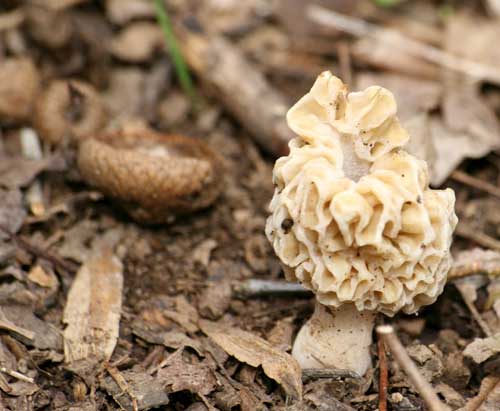
Partially-eaten morel mushroom.
(*photo credit)
February 15, 2018 Eat Less Meat
Along with ways to observe the penitential season of Lent, several good reasons for reducing meat consumption emerge:
Solidarity with Creatures. Vegetarianism involves a sense of compassion. Abstaining from meat is quite popular among those with a growing concern about the animals, our brothers and sisters. Some cease eating meat because of the inhumane conditions of feedlots and massive chicken houses where animals do not have the luxury of grazing and running in open pastures. The bent drumstick is a harsh reminder of what is happening in a poultry industry, where chicks cannot stand up straight and live normal lives.
Resource Conservation. As many of the world's people become more affluent, people in various countries are drawn to American customs including eating more meat and frequenting multinational fast-food-chain menus where meat is a major ingredient. The consumption of meat in our country increased fivefold from 1950 to 1999 to 217 million tons, double the rate of population growth. This has not stabilized and in fact with recent lower grain prices meat consumption actually rose from 183 pounds per person to 193 pounds in 2015 and expected to reach 200 pounds in 2018 (96 pounds chicken, 56 pounds beef and 48 pounds pork).
Note that grain conversion efficiencies vary greatly: feedlot cattle require about 7 kilograms for 1 kilogram live weight of product; pigs 4 to 1; chickens scarcely 2 to 1; and fish less than 2 to 1. The UN Food & Agricultural Organization stated (in 2006) that livestock production is responsible for more climate change gasses (18%) than all the world's motor vehicles as well as being a major source of land and water degradation. Livestock now use 30% of Earth's land surface, and 70% of cleared Amazon forestlands.
Human well-being and economics. Late winter is a season when some of us gain weight, and thus reducing food intake is a propos -- and cutting out meat can be part of this curbing of total food consumption; weight-reducing programs are liberating. Meat can be costly in comparison with home-grown vegetables, whole grains, and soy products. Our diet has no need of heavy meat intake; most other cultures use smaller amounts of meat in their cooking and have nutritious and tasty meals with less beef and pork.
Health. While a strong argument can be made that meat-eating in moderation can be healthy, still excessive amounts can cause gout. Corporate-generated meat products contain steroids, antibiotics and other powerful chemicals fed to the livestock. And what about the mad cow disease scare? Not all of the growth hormones and agri-chemicals have been flushed from the animal's body prior to slaughter. The meat-eating human being is the end of the food chain, and subject to bioaccumulation of toxic materials.
Prayer: Lord, help us to share radically with our fellow human beings; help us to curb our meat consumption.

An eastern redcedar branch with snow.
(*photo credit)
February 16, 2018 Attend to Entrances and Signage
Hospitality can and often is measured by the appearance of one's property entrance and any signage present. Creating a first good impression is a key to the virtue of hospitality. The entrance sign ought to be welcoming: keep it brief; make it legible and neat; install it prominent so it can be noticed quickly. Entrances may be inviting, friendly, and cheerful or, whether intentionally or not, they may be foreboding. Signs such as "MEAN DOGS, ENTER AT YOUR OWN RISK!" send a clear message: visitors, if you are able, come prepared for a struggle. Less obvious signs of limited hospitality include closed gates, apertures too narrow for most vehicles, darkened walkways, and a forsaken look to the place. One institution had five "don't" signs at the main entrance. Just how inviting is that.
Entrances tell a story in themselves. The manner of presenting one's home or institution is evident at the door, for your entrance is a statement to the rest of the world. Embellish it with added flowers and possibly edible-landscape plants such as berry bushes. These provide an initial demonstration of the service given to others, along with a commitment to God, people and Earth. Granted, decorations will take an effort on the part of home and grounds managers, but they are worth it. First impressions last, and flowers can put visitors quickly at ease.
A working solar entrance provides an initial demonstration of your self-sustaining relationship with your land. Reference: Photocomm, Inc. 7681 East Gray Road, Scottsdale, Arizona 85260 (602) 948-8003. Depending on the amount of light needed and solar accessibility, systems can run less than one thousand dollars installed. Through a local solar builder or expert, find someone to help site the location of the sign for best solar utilization.
Characteristics of any directional signs should include the following:
Functionality -- Essentially, signs point the way out of confusion, to some other portion of the grounds, or signify that the visitor has arrived at the correct location;
Sensitivity -- Through the entrance sign, one gets the first glimmer about the mission and goals of those who dwell here; the sign shows whether hosts are sensitive to visitors. "You can't miss it" is the most inaccurate statement ever uttered;
Hospitality -- Allowing others to enter and overcome their unfamiliarity with the place is important. Occupants need to trust the good intentions of the visitors;
Warmth -- Beyond a kind invitation is a spirit of the resident or group. In subtle ways entrances and signs communicate the occupants' happiness and contentment. First impressions are generally correct. At a deeper level, consider ways of communicating the wholeness of being open to others.
Prayer: Lord, make us more welcoming people through our signs.
Benefits and Risks of an Imperial President
Someone may argue at various times in history that a very strong leader is necessary even to the point of surrender of democratic collective functions or divided powers for the sake of preserving the state. Such an argument is not remote in the United States, especially when considering the Civil War in the 1860s when President Lincoln suspended Habeas Corpus and took some drastic measures to preserve the union. We look deeper and find that Lincoln considered himself very restricted in his use of powers and agonized on the issuing of the Emancipation Proclamation (except in rebellious territories and not elsewhere). He respected the principle of dispersal of authority to various branches of government and humbly asked the Lord for guidance on such matters.
The temptation is great to have imperial leadership in this modern day, even without some of the traditional trappings of nobility with its titles, court manners and bowing and scraping. This modern imperialism is manifest in modern Russia and China and to a varying degree in Turkey, Egypt and Saudi Arabia among others. As mentioned before, confronting complex problems in many nations through autocratic actions by the heads of state is quite tempting. Terrorism sets a tone of utter emergency and the call for a strong response by national leaders, who seek popularity and acceptance along with an ability to respond quickly for the nation's good. Centralization of power seems to many as the proper response.
These conditions are also experienced in the United States and can become the temptation of an office already emerging with some aspects of an imperial manner (heavy as far as exercise of safety and military options go). Add to this that the United States is the most powerful nation in the world militarily with far-flung bases on every continent, with over half the world aircraft carriers floating on all the oceans, and with a military budget that is half the world's, along with a host of nuclear and other weapons that could be launched at will and destroy continents. Now add to the military might that at least one person at the top is considering power a part of singular glory and proud boasting -- and perhaps with daydreams that this could elevate an active President to the equal of Washington and Lincoln.
The office of presidency ought to function as part of a robust democracy. Imperialism on his part has a way of tarnishing a democracy of, by, and for the people in a broad array of proper governmental actions. Has our present Congress relegated to the President some of the powers vested in it? Can Congress find itself able to acknowledge that its own responsibility has been compromised and it has within itself the power to declare war (though some circumstances may require instant decisions) and to call a president to specific limited powers as defined by our Constitution? And do all members of this august body realize that they have the power to remove a President from office if acting improperly?
Imperialistic benefits involve incisive action by one who is balanced and of sound mind; this person can take the place of the people if they are unable or indifferent to responsible acceptance of duties. Those who do not vote and neglect to take part in government are perfect candidates for becoming loyal subjects to an emperor. In this age of information overload the temptation is great to allow the leaders to do what they deem best. A false humility says that the task is too big for me to consider or manage or even become concerned over. "Allow that ideal emperor to handle the matter for he saves us from bother." But stop and think; is there such a perfect person in such a leadership role?
Imperialistic risks are often hidden from the lazy or non-caring. The bias for singular decision-making extends to some leaders, for power has a way of enticing and corrupting. The electorial system may close down or be so contaminated that the imperial leader reduces it to tokenism and concentrates power -- and numerous current examples in Africa and even Latin America today show this can be the case. Active citizen interaction can be short-circuited and power will not only emerge but stay fixed for the lifetime of the imperial ruler. What if the person practicing imperialism is not well-meaning and believes he alone is needed at this time in history; he becomes the possessor of administrative office and the legislative branch as well. What was considered an advantage in times of instant decision and sound judgment can suddenly become a major risk -- and in the cases of Stalin and Hitler -- nightmares.
Analyses of risks is part of the human condition. Certainly once the option is set for democratic process, the need for ongoing monitoring is necessary for balanced governance. If a president shows a propensity for imperialistic leadership, then the monitoring becomes crucial. The sense of being above the law caters to a personality that is willing to reach to the limits of legal boundaries and beyond. Why not start a war? A sense of being above others due to the nature of the office could tempt a person to disregard advice and count only on self-judgment and emotional reasoning. Imperialists can fool themselves and count on power affirmed by their sycophants; the common citizen be damned! The imperialist can fool some of the people, especially the voter base that put him into office and furnish them with a reason for their vote; he plays with fire and is regarded as brave and courageous by making quick decisions. The voter base seem privileged to be following as dutiful servants.
We Americans have opted for democracy and all the freedoms associated. An overly powerful president comes at a price; we cannot have citizen participation and blatant imperialism at the same time. Our leaders must be answerable and not for the election period alone, but throughout their tenure of office. Imperialism has certainly been creeping into our system as fewer vote or show interest in political life. This does not bode well and calls out for participatory citizen action, which must be cherished with urgency and care.
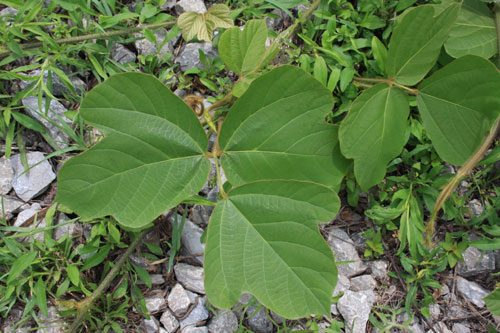
Vigorous leaves of the kudzu plant in southeastern Kentucky.
(*photo credit)
February 17, 2018 Tackle Invasive Species Such as Kudzu
In February, we have ideal days to work in the woods before the sprouts and foliage come out, the daytime temperature gets oppressive, and the bugs appear. This is an opportunity to remove invasive species -- and it is good winter outdoor work besides. Though verdant kudzu is a little tamed in winter, still we know, from the vines that cover telephone poles, trees, and even buildings, the heavy green foliage cover that is soon to come in summertime. But there are also more invasives as well.
Some ecologists regard exotic invasive species (those introduced and growing without natural enemies and under suitable soil conditions) as the most serious worldwide environmental threat. Unfortunately we do not have to look far to discover examples of the plant invasives: kudzu, Japanese honeysuckle, and autumn olives have been promoted by nurseries, used as cover crops or found to be bird feed. No exotic species that is a potential invasive should be allowed until its growing habits and controls are fully understood. Here both state and federal regulations ought to be placed on importation of non-native species, on planting and care of existing ones, and on nursery sales.
A difficult problem associated with threatening invasive species is that what is worrisome in one part of the planet is not necessarily so in another. Horticulturists are slow in getting certain plants excluded from nurseries throughout the country, because in places of origin the plant is fairly well controlled. Even kudzu is controlled in Japan. A general rule is that domestic growers should not introduce exotic species, but rather give preference to growing native ones that we all understand and can control. Naturalized plants can be tolerated, if they are not invasive and have no likelihood of spreading rapidly.
The history of kudzu in America shows a well-meaning effort to introduce a rapidly growing foraging crop from Japan, where it is used for grazing by goats and other livestock and carefully pruned. Kudzu societies with aggressive promotion schemes existed in the United States South in pre-World War II days. Kudzu liked the southern American climate so much that it went far beyond pasture fields and road cuts and began covering the entire countryside.
Some invasives could possibly be controlled through economic utilization. For instance, kudzu green matter is animal feed, but who can afford full-time goat herders? The kudzu root is a source of starch for highly prized Japanese dishes; vines can be used for making baskets and other craft products; and plant protein could be extracted and used for food supplements. Killing kudzu with herbicide is a last resort, but rooting it out with equipment is nearly impossible. Returning again to the trusty hand tools and willing muscle in late winter is one possible approach.
Prayer: Lord, direct us to what needs to be done to preserve our native species; guide us to be cautious about exotic species.
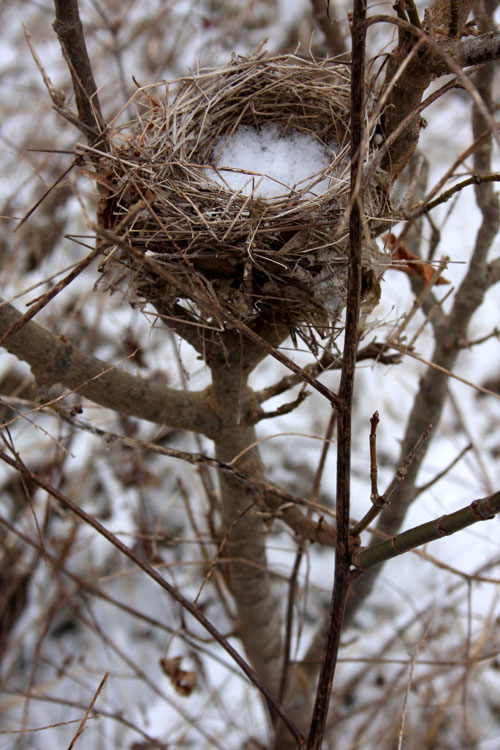
An unoccupied nest that has seen warmer days.
(*photo credit)
February 18, 2018 Endure Trials and Temptations
Trials and temptations are part of life, arising either from within ourselves or from without. God does not enjoy testing us, but we are allowed to experience some difficult moments. We are tempted to seek lives of comfort and success, if we but follow the course of least resistance. At Lent's start we strive to confront these moments that test our will power and commitment. Adam and Eve yield to temptation after being blinded into thinking of themselves as little gods. Suddenly they become aware of guilt and nakedness. Through trials the Israelites are tempted, wander forty years, turn from God, and accept false idols -- and then repent.
Jesus is tested immediately after his baptism. During this series of tests in the desert Jesus shows himself to be like us in every way but sin. Although Mark's account of the temptations is brief, both Matthew (4:1-11) and Luke (4: 1-13) speak of three such temptations though in a different sequence. Unlike our first parents and the Israelites, Jesus resists. These are the tests that deal with his upcoming public ministry when he announces liberation of captives "with the power of the Spirit within him." Becoming empowered occurs after being successful in overcoming temptations that are narrated in Matthew and Luke. Father Fitzmyer asks, "Could it not be that Jesus recounted some form of these stories as figurative, parabolic resumes of the seduction latent in diabolic opposition to him and his ministry?" (St. Luke Vol.1, p. 509).
A major temptation is that material things can give us security. "Not by bread alone" is the quote from Deuteronomy that Jesus uses in response to the test. It would be nice to be rich and to be totally secure in a material manner. "Would that I could have a million dollars and be able to do good." But worldly goods entice us to "need" more and more such goods. We are tempted by boats, planes, fast cars, credit cards, and goods of every type. Poverty may allow a spiritual security not found in overabundance.
Positioned on the Temple's pinnacle Jesus endures the temptation to do something famous, dramatic, to have a spectacular entry into public life through the flare for attention, and to be an instant hero. We dream of soaring among others like a figure skater who floats about effortlessly. We dream of obtaining fame through deeds of glory. We are enticed by the pretending world and forget that obedience to God's will is part of the ever deepening mystery of our life's journey. Turning from reality is tempting.
We seek power over others and fail to see that this is corrupting. The splendor of God's creation can mesmerize us, allowing us to be detoured into seeing creatures as idols or the objects of our greed. Rather, we are expected to be single-hearted and chaste; only in God do we trust. Also see Benedict XVI, Jesus of Nazareth, Chapter Two, "The Temptations of Jesus."
Prayer: Lord, lead us not into temptation.

Raindrops on leaves of roses.
(*photo by Sally Ramsdell)
February 19, 2018 Striving to Live in Hope
I can hardly imagine living without hope. As for the future
of the world, there is a colorful spectrum of possibilities,
from the worst to the best. What will happen, I do not know.
Hope forces me to believe that those better alternatives will
prevail, and above all it forces me to do something to make
them happen. -- Vaclav Havel
President's Day. Havel became a model proponent of hope, and this included better alternatives to both the environmental and human rights disaster of Soviet Communism as well as the excesses of the capitalism that burdens us increasingly in this modern age. "The West is also a system of impersonal power, especially through the practices of multinational corporations and "the omnipresent dictatorship of consumption, production, advertising, commerce/consumer culture." Reference: Vaclav Havel, "Power and Powerless" in Living in Truth (London: Faber and Faber. 1989). People like Havel and Nelson Mandala have suffered from long periods of imprisonment and have had the time to reflect on what is happening in our world. However, even when seeing the faults of the so-called enlightened cultures of the West, they have not succumbed to despair. Hope carried them through.
The same sense of hope can be said of George Washington during the darkest days of the American Revolution. In the winters of 1777 through 1780 his Continental army suffered from lack of supplies, desertions, poor living quarters, and a lack of general support by the Congress and other nations. Would it endure and see the completion of the Revolution? Though Washington saw the faults of the system that he was trying to overcome and the inherent weaknesses of isolated colonies, he and his close associates still had a vision of a future democratic republic.
This same sense of hope can be found in the life of Abraham Lincoln in the dark days of the Civil War from 1861 to 1865. Just as in the Revolutionary War, there were sustained periods of time during the Civil War when the cause could have been lost. It was enduring hope -- and prayer -- which made Lincoln a great leader through a dark trial in American history. In much the same way it was hope that carried Franklin D. Roosevelt through the dark periods of the Great Depression and the period leading up to and including the Second World War.
Great leaders exude hope. Today all citizens, leaders and citizens alike, need hope in troubled times. Health costs (just out-of-pocket expenses) are too high; foreclosures confront many; Middle East wars drag on with an unclear ending in sight. In hope, the root of terrorism can be exposed and measures taken to change the climate of hopelessness. In hope, we can change a world of haves and have-nots to one of justice for all people.
Prayer: Lord, give us a deeper sense of hope that we can overcome the barriers that divide our people today.
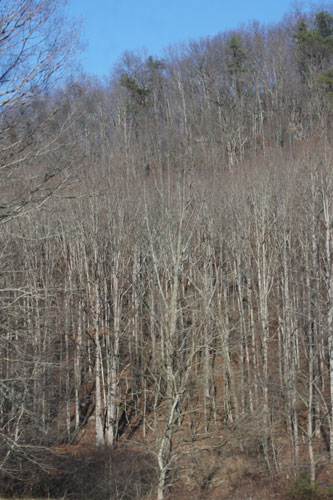
Forest edge near Appalachia - Science in the Public Interest, Livingston, KY.
(*photo credit)
February 20, 2018 Utilize Wood Properly
In order to reduce carbon dioxide emissions we ought to review our proper utilization of wood. A youthful Abe Lincoln was a rail splitter and grew up in log cabins; Washington chopped cherry trees -- at least in myth, and he surveyed the woods of Virginia. How do we utilize our wood(s), treat our forests, and care for our trees? Cutting down trees is one thing; preventing pollution by utilizing wood wastes is another; reducing carbon dioxide through healthy forests is still another. Industrial chippers can possibly consume the whole tree: branches, leaves and trunk -- even roots, if they could be extracted easily. There are good and bad forest practices, some far more sustainable than others. A number of ways of using wood "wastes" include:
Cones, needles and leaves -- thatch, decorations and compost.
Roots -- decompose, or use for erosion control.
Trunks -- discarded logs for wood critters, defective logs for fuel wood and knots for making bowls, or small cedar logs as cordwood building material.
Branches -- larger ones for Shiitake mushrooms, smaller ones for walking canes, pole ladders, kindling material.
Bark -- tannery products, natural dyes, siding, mulch, cane back chairs and baskets.
Sawdust -- carbonaceous organic matter for compost toilets, packing (especially cedar), paths for gardens (especially herb gardens), soil amendment, insulation, and pressed logs.
Shavings and chips -- animal bedding, packing, trail surface, and tender for starting wood stove fires.
Post Ends and slabs-- borders for flower or garden beds and logs for cordwood buildings, siding or exterior and interior walls, compost bins, and fencing.
Even the phrase "wood wastes" is a misnomer. Nothing ought to be wasted in using a tree and the more careful lumber processors and builders know this quite well and so do deconstruction people. In wrecking a building, some materials need only nail removal. In fact, demolition sites as well as construction sites are potential mines for good quality materials. Old wood is perfect for creative types of furniture; planks can be used for scaffolding, rafts, boat docks, and animal pens. A bit of caution: take care, for salvaging can be dangerous work.
Prayer: Lord, give us an appreciation of trees to such a degree that we always respect their presence and use them well; help us never waste valuable wood resources.
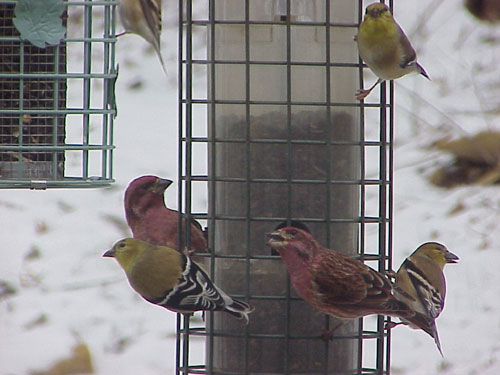
Finches clustering at winter bird feeder.
(*photo by Sally Ramsdell)
February 21, 2018 Frequent Public Worship Space
We show gratitude to God in public acts of worship in such formal sacred settings as chapels, shrines, cathedrals, monasteries, and simple churches. Here worshippers gather in pleasant unencumbered public space; these are consecrated areas reserved for the worship of God, and made available for prayer and reflection by all people. Furthermore, the design and functionality of formal worship space reflect cultural sensitivity. If worshipers are elitist, the space is exclusive; if they are pretentious and showy, the space is gaudy; and if the worship is genuine but simple, the space may be welcoming and receptive. However, attractiveness is not directly connected to affluence. In fact, very humble worship space may be quite tastefully done and exude the warm feelings needed for worship. Decorations, access, light, materials, and spatial arrangements draw people to pray.
Throughout history, churches and sacred space have served a variety of non-worshipping functions such as --
* "Bridges" or transmitters of culture. The monastery served this function in the Dark Ages.
* "Sanctuaries" or places of protection for those in trouble with the law. Today the church could serve as sanctuary for native plants and animals; it may be necessary in this time of immigrant expulsion to open the doors for church as sanctuary.
* "Educational facilities," either in the use of the space in non-worship times for schooling, or through decorations and art as a way of elevating the unlettered through pictures, statues, and stained glass. Environmental education may include posters, book corners, designated indoor or outdoor plants, and expressive art.
* "Home" for a community that may not have hospitable surroundings or dwelling places. At such times the place becomes a warm and inviting space, where people know each other and share experiences. It draws those who are otherwise isolated.
Worshippers who build their sacred space may manifest creative and artistic skills and fervor. These cooperative endeavors are key to building community. Work is enduring when builders possess a sense of history and knowledge of native materials and practices. Down-to-Earth worshipers create buildings that reflect their own aspirations. Worshipers may assist in the design of a worship space but leave construction to professional contractors. In their design work, formal places of worship should obey ecological principles: a location that "feels" proper or resonates with worshippers; heating and cooling by using renewable energy sources; sharing space with others where possible; and building tastefully through the use of native materials.
Prayer: Teach us, Lord, to worship together in spirit and truth, and to be able to do so in an inviting public space.

Partially-frozen Thompson Creek, Anderson Co., KY.
(*photo credit)
February 22, 2018 Consider Domestic Waterfalls
A popular decorative and water-sounding device is an artificial "waterfall" within or near a home. I once saw a natural waterfall within the Burns residence in the Ozarks, where a summer residence had been constructed surrounding the falls itself. A rare site! In fact, building around natural waterfalls can disturb the natural landscape that could be appreciated by the public, and there can be technical problems associated with variation in volume of water. Rather, consider an artificial waterfall that has many advantages such as a soothing sound and a quieting atmosphere for all residents. And the water can be recycled.
Outdoor and indoor artificial waterfalls come in a variety of shapes and sizes. The outdoor ones are usually water troughs which flow downhill into a collecting pool, from which a pump recirculates the water. These waterfalls contain basins that can be decorated with objects such as rocks gathered from different places. Solar water pumps can serve as energy source for circulating external waterfalls, operating when the sun shines.
Internal devices are generally far smaller and can sit on stands. One called Moon Shadow Water Fountain is a dish above which is suspended a globe. Over this a tube brings water that flows over the whole surface, is collected and then recycled. Various designs can recycle water effectively, and these selected according to sounds and sights pleasing to the user.
Joseph Campbell characterizes the sound of water as a primitive sound, which is recognized by all people. It harkens back to our earliest instincts and our first emergence from water millennia ago. Certainly this sound, along with that of a burning hearth fire, can have healing effects on the nerves. The same effects that are given when speaking of external water fountains apply to both domestic outside or inside waterfalls, except that the bubbling spring effect of a water jet is absent. The sight and sound can establish a nice ambiance for domestic space.
Some who design interior space suggest installing artificial waterfalls in offices, banks, doctors' waiting rooms, dentists' offices, and restaurants. Churches have installed baptismal fonts with permanent waterfalls in the entrance area. Waterfalls are sometimes temporary as at Easter time when running water is a prominent symbol. The only disadvantage to the sounds is that it can cause some members in congregations to use the restroom more frequently. Devotees of Chinese philosophy have more elaborate schemes of placing the running water at the center of the room, and providing a reflection area for people to sit or observe the water's movement and sound and utter a wish; many cultures associate running water with good luck. Consider small waterfalls as ideal gifts for ailing or invalid relatives or friends.
Prayer: Lord, the sound of water reaches deep within us. You are the wellspring of life and remind us through sounding water.

Weathered barns on Franklin Co., KY farm.
(*photo credit)
February 23, 2018 Does America Have a State Religion?
Every year during Superbowl season, we are forced to reconsider just how religiously people watch or participate in this national event. Does this communal celebration tap into the substratum of our common national religiosity that has been tested by this current Administration? Disquiet pervades our land, and the "god" or economy in whom we have trusted is now called into question. Are our most popular sporting events (real money-maker) a hollow celebration? Maybe it is time we reexamine our undeclared state religion with all its structures, rituals, and its own god.
The State Religion is the American Economic System.
The god in whom we trust is our money.
The high temple's sanctuary is Wall Street.
The indoctrination system is the mass media.
The sacred orders are the noted business degrees or the privilege of all the wealth you want.
The current high priest is the FTC Chairman.
The hierarchy is the notables on Wall Street.
The clergy are second string bankers and the business elite.
The parishes are corporations and banks.
The pews are computers and Internet.
The aisles are the Interstates and Internet.
The prayers are e-mails and ATM transactions.
The prayer cards are credit cards.
The creed is the American Way.
The church banners are advertisements.
The liturgical celebrations are sitcoms and sporting events.
The Church picnic is the Superbowl.
The collection basket is the deposit account and the collectors
are the IRS agents.
The introductory song is The Star Spangled Banner before each
major liturgy.
The excommunication is jail for felons – especially for bucking
the System.
The main sins are being humble instead of greedy, public interest
instead of self interest, living simply instead of being a wanton consumer, and not questioning the American Way.
The missionaries are free trade folks working through American embassies.
The goal is the total triumph of greed.
The dutiful rank and file are the housing, universities, businesses and, unfortunately, many churches.
The heretic is the one who holds that all have a right to the resources of this Earth.
Woe to you who do not follow the System; you will be rendered
marginalized.
Prayer: Lord, teach us to tear down the idols of our land and rebuild an economy that promotes peace and justice.
What Can We Do About an Imperial President?
Citizens are aware as mentioned in the last two essays on this subject about the presence of an emerging imperial presidency and how this can be a grave weakness at this time in history, both from the perspective of battling climate change and of safeguards on overly hasty military engagement. Can we as individual citizens take any actions apart from showing disapproval of the state of present affairs? Perhaps we can act effectively both as individuals and as members of organized groups or parties, who share a deep concern about current conditions.
The first thing is to regard the matter of an imperial president as counter to our patriotic right as a free people to have democratic elected leaders answerable to the citizenry. We must dissent when a leader refuses to act in a strictly leadership role and rather acts as a self-styled opponent to the total citizenry. If the actions of the individual shows disregard for a portion of those under his or her sworn oath of duty then this practice must be pointed out and publicly opposed. No strictures opposing non-profit status participation in partisan elections should hold one back, for this becomes a moral duty like voting once we accept our citizen's role in a democracy. Silence would imply acceptance of this imperial conduct -- and heavens forbid.
In this age of easy communication we must not hold back; we must manifest our duty of speaking out on critical issues. If we see a need for opposition we must create it. This option by the public cannot be dismissed, since opinion and public policy can be swayed through focused and concerted actions. We are not flailing about when a rising number have had toes stepped upon and call out for change in policy. Imperialism must be confronted.
Know the issues. The citizenry must discern whether imperial action is impeachable, for it may reveal the officeholder as unsuitable for the monumental task at hand. However, obtaining congressional action would be quite problematic without some specific action that makes the leader unfit for continued service. An imperial stance can lead to opposed actions even if the attitude is not impeachable in itself. New presidents swear to uphold the Constitution of the United States and that must be done to the best of their ability. A willingness to thwart the will of the people and protect their safety in military or environmental matters could be grounds to initiate such actions as impeachment -- and citizens would then have to call on Congress to do their own sworn duty.
Connect legislators, especially your own Senators and House of Representative members through email, personal letter, phone messages or attendance when public meetings are held near your residence. This matter of the conduct of the President should be as much a concern for all of us, and especially of these legislators holding key positions in Congress. Every notice of concern adds a little to swaying a responsive legislative branch.
Organize others. A further anti-imperial activity is to encourage others to do what we are doing to contact Congress and even write the sample message for them. If we constantly act alone we are soon known by name within the Congressional office that we attempt to influence. One petition among many is not specifically noticed and yet has a limited or enhanced influence of the multitude. Rarely noticed individual voters can make a difference. Their personal lobbying is all the more influential even when they act for the first time; they need to be familiar with the issue.
Pressure for attitudinal change. Has imperialism reached the point of initiating impeachment? Remember that making this a partisan issue may be more detrimental than skipping it altogether. A broader perspective is necessary for our nation must be highly united when policy changes are forthcoming. Can citizens be expected to wait until a solidly impeachable act has been committed, at which time damage may have already occurred? The key is to see a given time as an opportunity to enlist members of the party in power to get to the President and effect attitudinal changes most likely through the graces of close relatives. Is this a practical strategy given the personality at stake?
Environmental concerns are of utmost importance. Our environmental educational mission calls for action. Urgency on the issue of global warming cannot wait for others to journey voluntarily to a proper perspective. Failure to act could imperil our planet. The issue of climate change is sufficient even if uncoupled from erratic military decisions. Being the only nation to withdraw from the Paris Climate change Agreement is noteworthy; the excuse is to expect a better procedure is virtually nil given the blunt assertion by the French President Emmanuel Marcon that there is no room for changes -- and he means it.
The Military issue. We have a second critical issue that is not as long-ranged as the environmental agreement, for a decision may have to be made on fairly short notice. Here a longer range destruction of our environment (of which compensation is being made by green state governors and other leaders) gives way to short and perhaps split-second decision-making. An imperial president could be far more costly if persuaded by those around him or by the way he gets out of bed that a decisive action such as the destruction of North Korea is needed on a first strike basis, or in response to a missile launched at some undetermined object. This weighs on all across the partisan divide -- and this needs collective attention.
The critical question. The question that faces a nation and its leadership is whether the President is so colored by imperialism that he is blinded to rational discernment. If he is convinced that he is better informed and of greater talent to make actions in the pattern of an illustrious statesman, then advice is of little moment and he will act. God help us! Impeachment does appear as an immediate option, but is it emerging?

Shagbark hickory, Carya ovata. Rowan Co., KY..
(*photo credit)
February 24, 2018 Acknowledge Our Need for Rest
Silence is golden, but do we value it as a time to rest? A busy society always gives special attention and approbation to those who are active -- even superactive. Why? It makes better media coverage and shows someone doing something that is meaningful. Actually silence and rest are environmental needs but are hardly media worthy.
Activity must always be in harmony with rest. Unfortunately people often quietly hope that their silent space is not infringed upon in waiting rooms, on public transportation, or in Church before the beginning of a Service. The busybody is expected to respect another's need for rest, but even this individual needs rest. How many overly active people drop off asleep at a moment's notice at a movie theater, on a passenger train, during a lecture, or even reading this website? Heavens forbid! Even people who say they can tolerate noises will doze off given a moment of silence.
People, who are solicitous about their own health and well-being, should create and preserve their silent space -- and seek to find it when needed. They may need some nap time during a busy day. We can each ask ourselves whether we get enough sleep and are we willing to admit to the need of more. Being sleep-deprived is never healthy and results in poor performance in driving and other needed activities. Am I willing to increase break time, if need be in driving and elsewhere? What about the longer breaks that are needed in our lives? Free days and days of rest? Annual vacations? Even the possibility of sabbatical leave?
Many of us tolerate (or think we tolerate) chaotic situations. Even those with so-called "nerves of steel" are not in complete control. Rest places and times are most important to all of us. Many stress-related industries recognize the need for rest through mandated time-off periods; by means of state and federal regulations, transportation personnel are required to keep logs and take mandatory breaks. Assembly line workers are required to be alert, as are service employees, and traffic controllers.
Rest is required, but when our lives lack mandated controls we can be harder on ourselves. Many of us (including this writer) spend far too much time before a computer screen, which may or may not have attached sound. Dr. Sydney Blair, a medical expert on hand-related health problems, told me once that no one should spend an excessive length of time at a computer. Really? Only two hours a day? On the other hand, medical experts predict a spate of computer-related occupational hazards, namely stress on eyes, hands, back and neck. Spending entire days at the computer should be questioned. At this point I will take a break.
Prayer: Lord, you rested on the Sabbath, and intend that each of us do the same. Help us to see the need to rest and relax, since we are not the masters of our time -- and we all need continued harmony in our lives.

Fungi hidden among weathered leaves on tawny forest floor.
(*photo credit)
February 25, 2018 Participating in the Transfiguration
This is my beloved Son. (Mark 9:2-10)
We read Mark's words today and join Jesus and the disciples as they climb Mount Tabor; we fall down with the apostles at the transfiguring sight and are as though in a trance; we awaken to the magnificence of the event, Jesus standing between and conversing with Moses, the greatest of the lawgivers, and Elijah, the greatest of the prophets; we feel privileged just being virtually present and that is satisfying. However, let us sincerely ask whether we can do more than just be consoled at Jesus' anticipated victory.
On second thought we realize that our invitation has a purpose: we are to participate in the event in new ways: we awaken fully; we see the light radiating from the event; we feel the wind on the mountain top; we listen to the voice of approval coming from the heavens through the clouds. We hear Peter ask to make a memorial at the site; and we resolve to do something meaningful.
He saved us and called us to a holy life, not according to our works but according to his own design (II Timothy 1:9).
During this Lenten season we realize once more that we are called to participate in a uniquely personal way that only reveals itself through time and prayer effort. The Giver of life has invited us into the divine family and that means contributing something to the mission of Christ himself. Certainly we have earned no participating role; rather emerging from the clouds of our unworthiness we discover that God's gifts are given while we are still sinners. Sincere gratitude becomes the radiant light; the grace of consolation floods the soul in Lent in contrast to the celebration of glory on the August 6th Transfiguration Feast.
All the communities of the Earth shall find blessing in you. (Genesis 12:3) The blessing that is God's gift to us is to radiate out from us, anticipating that glory will come from the risen Lord even when not yet realized. We become enthusiastic even in times of risk -- showing forth the God within. In being present we allow others to discover the Messiah in whom we believe and live. Transfiguration calls us to truly be Christ for others. We accept God's love by extending gratitude through sharing with the needy.
We become open to God's grace; we sense the power within that is not from us; we are determined not to hide or deny this power, not to excuse ourselves, not to seek to escape our calling to be holy people. We start to believe in the power that transforms us and can do so for others. Being present at the Transfiguration allows us to see the magnificence of the risen Jesus who is Lord in power. Through the fullness of baptism we enter into this glory, but realizing that we are called to risk and go to Calvary with Jesus. This is an opportunity to ultimately share in his glory.
Prayer: Lord, transform us and our deeds through your glory so that others can perceive your glory shining through our service.

Mourning dove, Zenaida macroura, prepares to take flight.
(*photo by Sally Ramsdell)
February 26, 2018 Construct Privacy Screens and Noise Barriers
When driving along in an urban or suburban area suddenly walls begin to appear at the side of the road. They are concrete or sometimes wood or even vegetative barriers and they stretch for long distances, sometimes on both sides of the road. It is like moving through a canyon, and we feel claustrophobic. On second thought, we recall the homeowners who would otherwise have the intrusion of road noise and of people looking into backyards when residents want to swim or party. Why should others infringe on the residents' privacy? However costly the barrier, they have benefits, which many homeowners are willing to preserve.
The gated-communities of elite colonies do not appeal to many of us, but realizing that intruders are both noises and roaming trespassers makes the cost outlay justified for the privileged. Are the affluent returning to the rationale of castle building? People need private getaways from a fast-paced and stress-laden world, noisy traffic and constant intrusions of motorcycles, sirens and squealing tires. People want to privatize themselves and their home, yard and garden -- and that desire includes all of us.
Privacy zones can be created. Wire or picket fences may not prove sufficient if you are trying to escape public gaze; yes, desire for privacy is good for mental and psychic health but it may take effort to secure. Sometimes getting away to a distant place will help satisfy the short time craving for privacy. Furthermore, we can use sound-proofing and other materials and devices to create our own private space. Much depends on our own living conditions.
February is the time to order plants -- including vegetative privacy barriers for living or work space. Consider rather dense shrubs or trees, which can be placed at the property or space boundaries. Vegetative barriers are aesthetically more pleasing than concrete or wooden walls, can be cooler in summer, and allow for natural nesting for insects and wildlife -- and they cost less to the pocketbook and in resource use than constructed "artificial" barrier walls. For such vegetative barriers, use native plants.
In many eastern parts of the country evergreens such as cedar or white pine furnish a thick and inexpensive natural barrier. In others, such hedges as Manchurian cherry allow for quick-growing vegetative barriers that increase privacy and reduce noise. Dense non-native hedges or shrubs should only be considered if they are not invasive. Hedges like mock orange, tatarian and other honey suckle, and European privet have become popular methods of limiting the visibility of the property. Consider snowberry, wisteria, and viburnums as possible alternatives. Hedges such as holly varieties are dense, bear edible fruit, display attractive blossoms, and encourage beneficial insects.
Prayer: Lord, allow us to make way for the quality space we need for rest and privacy -- provided the methods we use are in keeping with the common good of the community.

The quiet life of a beloved pet.
(*photo credit)
February 27, 2018 Simplify Life as a Community Project
Lent is a time to review our American lifestyles, renew our past resolutions, and try to take better care of ourselves. We take seriously the message found in essays, sermons and homilies: Americans consume about one-quarter of the world's resources and only comprise five percent of the world's people. If the rest of the world lived like us, the available resources would be heavily compromised in a short time. All the while, we know that the hungry and destitute are only a doorstep away, at least via the TV and Internet. The parable of Lazarus becomes more vivid with each day. "Rice bowls" are passed out in Lent-observing churches and schools; fasting includes coins for the needy; maybe in Lent we try to abstain from goodies or eat less meat (see February 15th).
Yes, and simplifying lives also has a host of blessings such as saving money, feeling in solidarity with the poor, and improving our own wellbeing; living simply intensifies our spiritual life, enhances our prayer life, and improves our ability to control the allurements of life. A simple life is a more healthy and psychologically sound one as well.
One of the great mistakes in simplifying life is to think only in individual terms -- what I do to show others how observant I am and how much I am an example for others to follow. In fact, living more simply should be more a family, group, and community project. Within a community a new awareness begins to emerge, namely, that affluence is addictive and deadening. An awareness of simple living steps, such as eating less meat at meals, or conserving energy, opens vistas for improvement; and this is better achieved within group dynamics. Living simply is Good News for, from and through all collaborating community members -- a group undertaking.
Within a participating community we confront the prevailing basic libertarian philosophy, "Let all do as they please, provided it does not hurt anyone else." Simple living folks should not be intimidated by that prevailing culture. Rather they must see that excessive affluence has brought down nations, caused decline in religious life, and led to massive inequalities and insensitivity to human needs. Prophets like Jeremiah, Isaiah and Amos have said as much. Communities can become more prophetic and models for others to follow. If we are ridiculed, at least it is a community and not individuals who must bear the opprobrium.
Affluent living can be an addiction. An intellectual campaign, even an Earth Literacy Program, is not sufficient if people are addicted to wasteful lifestyles. Is it effective to sponsor "distillery" educational tours or general lectures on alcoholism? On the other hand, a successful Alcoholics Anonymous (AA) program helps people to strengthen their collective will power, proving far superior to individual persuasive approaches to breaking addictions. We can learn from the AAs to collaborate.
Prayer: Lord, move us to simplify our lives in community.
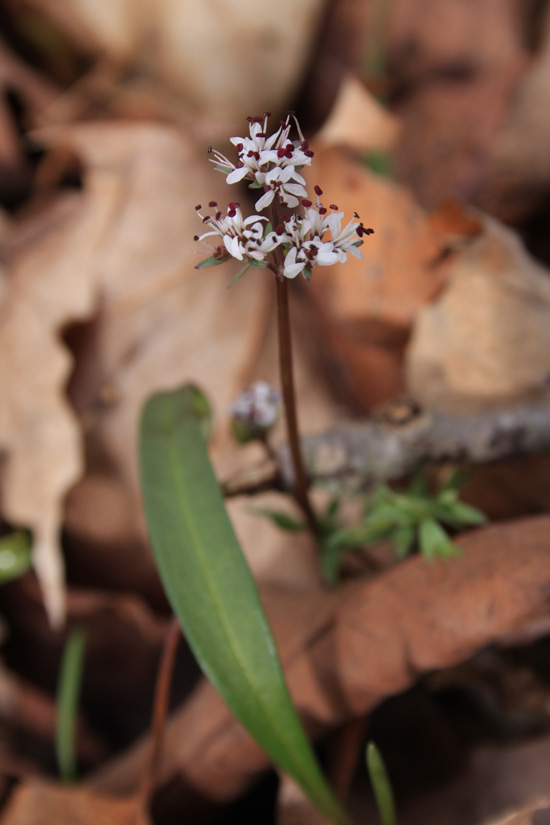
Harbinger of spring, Erigenia bulbosa. Madison Co., KY.
(*photo credit)
February 28, 2018 Pray for Global Restoration
Good and Gracious God,
Source of all Life,
all creation is charged with your Divine Energy.
Ignite your spark within us,
that we may know ourselves
as truly human and holy,
irrevocably part of the Web of Life.
All creation
-- each star and every flower,
-- each drop of water and every person,
-- each and every atom, down to its very electrons,
explodes with the revelation
of your Sacred Mystery.
Our minds alone cannot fathom such splendor.
Our hearts can only respond in awe, praise and gratitude.
Forgive us, we pray, our ignorance
and insecurities which
-- blind us with your Thumbprint written large,
-- deafen us to the sacred space
between two heartbeats,
-- prompt us in arrogance to demand and dominate,
-- numb us to the destruction we've caused,
-- hold us hostage to "either-or" thinking and living.
May we always walk gently upon the earth,
in right relationship,
-- nurtured by your Love,
-- taking only what we need,
-- giving back to Earth in gratitude,
-- sharing what we have,
-- honoring all with reverence,
-- reconciling and healing,
-- mindful of those who will come after,
-- recognizing our proper place as part of,
not apart from, your creation.
Grant us the strength and courage, we pray
for such radical transformation into your Kingdom.
Then we, too, with the very stones will shout,
"HOSANNA."
by Michelle Balek, Pax Christi, 532 W. 8th Street
Erie, PA 16502-1343
<info@paxchristiusa.org> |